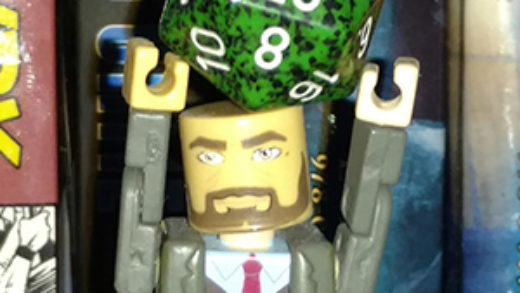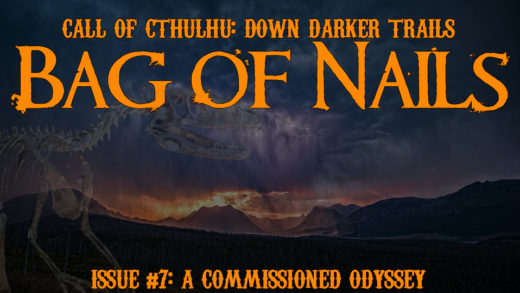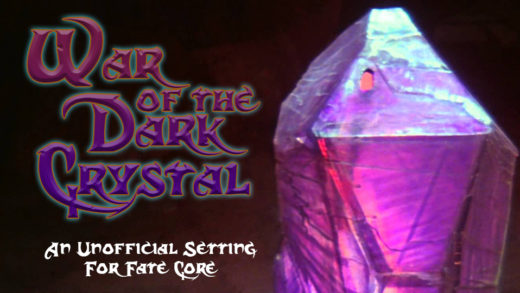If magic exists in your game world, then it’s likely that black magic also exists. Many high fantasy games include curses and items, but often fail to emphasize the fear that should exist around a curse. As another month of fright begins, let’s take a look at that old, black magic.
Remove the Dice Modifier
In RPGs cursed items are most typically signified by a negative impact on dice rolls. However, this can alert players to the fact that there is a curse around them in one form or another. In these situations it can be difficult for any player, no matter how in character, not to meta-game. It also reduces the curse to a math problem rather than one of role-play. When GMing a curse consider taking the improvisational actor adage of “yes, and” putting a more negative spin on it to “yes, but.” Yes, that roll succeeded, but it had an unexpected negative impact. This is my primary tactic when dealing with the most common curse cast against player characters: hexes. But there are other types of curses that, once dispensing with the math of dice roll modifiers, can be more easily integrated and thought of in a game.
Bad Luck/Hexed
Hexes are common throughout media and gaming. They’re nebulous enough to apply multiple negative impacts to a character without causing death—depending on the power of the curse. Here is where the “yes, but” option can be most effective and is easy to utilize in and out of combat. The uses can be as subtle or as blatant as you want, depending on how quickly a player should learn their character may be jinxed.
- Yes, you stab your foe with your sword for the expected amount of damage, but your blade breaks in the process.
- Yes, you successfully convince the guard that you’re meant to be here, but the fire alarm goes off, putting everyone on high alert and the guard ushers you out.
- Yes, your grappling hook latches on to its target, but you didn’t realize mice had chewed on your rope and it breaks while you attempt to scale the wall.
- Yes, you use your lore or knowledge to identify the magic item, but it made you think of a song related to the item and you just can’t seem to shake the earworm.
Also, consider what bad luck may befall a character outside of rolls.
- Vermin-penetrated packs, ruining food or supplies
- A sudden infestation of bedbugs or lice
- The only guest at a table served bad food—this could be overt, where the food tastes horrible or more subtle, where the food later affects the system
- The only character in a group to step on a slippery patch of slime or ice that had gone undetected
Death Curse
The second most common curse, especially in media, is the death curse. A simple promise that those under the spell will die an untimely death, often sooner than the character would like. These curses are rarely used on player characters given the nature of failure, but a death curse could be a plot hook should it be cast on an NPC close to the character. A death curse may also be a portent of how the character will die, such as “you will die alone” or “when you die, those close to you will laugh.” This type of curse implies no date of death on the character, but may alter their general actions, attempting to circumvent the promise of the curse.
Ravenous
This is a highly specific curse more likely placed on an NPC or as a very direct retribution for a food-related slight. The end result is that no matter how much a character may eat, they are never sated. If placed on a player character, this could be a slow-acting curse. The cursed character may start out eating more than usual and as each day goes by they become hungrier and hungrier. In fantasy games where the character’s race may already be one of voracious appetite, this might be harder to spot. But soon the character’s focus should be on nothing but food, affecting all they do and their entire motivation every waking (and sleeping) moment.
Nightmare
The nightmare curse affects the rest of the afflicted, causing any moment they close their eyes to be filled with frightening, and often violent, images. Not only can this type of curse impair the victim’s mental state, it negatively impacts their ability to rest and sleep, which can cause further damage, long-term.
Love Curse
In many media presentations the love curse is presented as a love spell gone awry. This would be one way to present the curse (especially if the PCs are helping someone hexed by their own magic), but can also be cast specifically as a malison. The target may not even be aware of the curse initially, seeing it as people falling in love with them and possibly presenting them with gifts. As the spell builds it can turn dangerous as the lovers become jealous and covetous, not wanting the doomed soul to ever leave their side—no matter what condition.
Cursed Items and Locations
In some instances curses are transferred via and item or cast upon a specific location. The former is typically presented in the TV show Supernatural as hex bags, but more often media presents cursed items as more innocuous to their surroundings. Cursed locations often involve tombs or holy relics imbuing damnation when trespassed or transgressed. Unless using a mechanic like a hex bag, cursed items should have a story as to why anyone who holds the item should be cursed. Cursed items and locations may also imbue non-standard curses, such as a weapon that subtly whispers to the wielder, urging them to go on a killing spree—including their companions. While many items may invoke unease by re-appearing after their disposal, consider the alarm that might rise when a building or home continues to re-appear in new areas.
Lifting a Curse
Even removing a curse should come at some sort of cost. This may be time spent finding the item surrounding the curse and destroying it or convincing the spell-caster to remove the curse (as only in rare cases should their death affect the curse). Additionally, once the curse is identified, a particular white magic or banishing spell could take time to dissipate the curse, leaving the character wondering if the curse was lifted. It may also require a sacrifice of some sort, be it a treasured item or a deed owed the curse remover.
Of course, some curses can’t be removed and there is no happy ending. Happy Halloween!



Recent Comments